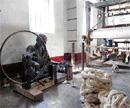At a time when affluent foreign investors are knocking on the country’s doorstep, a silent khadi movement involving locals has spread its roots at Melkote in Mandya district.
Spearheading the movement is Janapada Seva Trust, which was started by Gandhian Surendra Koulagi in 1960.
Even though khadi witnessed a decline during the last couple of decades, Surendra Koulagi believes that khadi will continue to play a major part in our lives. Assisting him in the endeavour are his sons Santhosh and Sughosh Koulagi. Janapada Seva Trust, which runs ‘Hosa Jeevana Daari’, has more than 20 women spinning and weaving clothes.
Speaking to Spectrum, Santhosh Koulagi revealed that demand for khadi has been on the rise during the last two years. He believes that change in the mindset of the middle class has led to the revival.
At one time, khadi was shunned as it had limited options and remained unfashionable. Taking on these two factors, the Trust has now sought the assistance of a designer to ensure that khadi changes along with the times. As Surendra Koulagi says, “Now the emphasis is on coordination between the old and the new.”
The emphasis has now been on lending a stylish twist to khadi. The Centre also makes dhotis and quilts. In order to ensure that khadi remains eco-friendly, the Trust is using only natural colours for dyeing the fabric.
Elaborating, Santhosh says, “We are introducing natural dyes made out of roots, barks, leaves, pomegranate, betelnut, arecanut and indigo. At the same time, we are trying to use eucalyptus, which is found in abundance in the area and gives a light blue shade as natural dye.”
Explaining the importance of khadi, he says, the fabric is entirely handspun and hand woven. Gandhi realised that khadi could provide a means of livelihood to millions of people, Koulagi remarks.
At present, Janapada Seva Trust has been able to produce 1,000 metres of khadi fabric each month. Apart from the investment being low, khadi production is also cost-efficient, he says, adding that it can provide employment to a large number of people. With eco-friendly products gaining importance during the recent years, the aim is to revive khadi in each household here, once known for weaving.
Recognising the threat that khadi faces, Santhosh says, “Unless khadi is revived now, there is fear of losing skilled workers. Melkote was once known for its community of weavers and more than 100 families thrived on the trade. But, now many have give up the trade because of insufficient income. Once the skill is lost, it is difficult to master it again.”
Steps to popularise khadi
Noting the steps taken by the Trust to penetrate the retail market, Santhosh mentions that they have sought the assistance of designer Tara Aslam, who runs Nature Alley in Bangalore.
He credits Tara Aslam for providing inputs on the designs for kurtas and shirts, which are made at the Trust. Janapada Seva Trust is also planning to showcase its products at ‘Gandhiji and textile of peace’, a national-level exhibition scheduled to be held between October 2 and 12 at New Delhi.
The Janapada Seva Trust also runs an adoption placement agency in Mandya district. “Under this programme, any abandoned child found between the ages of one day and five years is sent to the Trust by the Department of Women and Child Welfare. The Trust provides support to the child and also makes efforts to locate biological parents and if not found, the child will be handed over for adoption legally,” says Santhosh.
source: http://www.DeccanHerald.com / Home> Supplements> Spectrum / by Manish / October 01st, 2012
